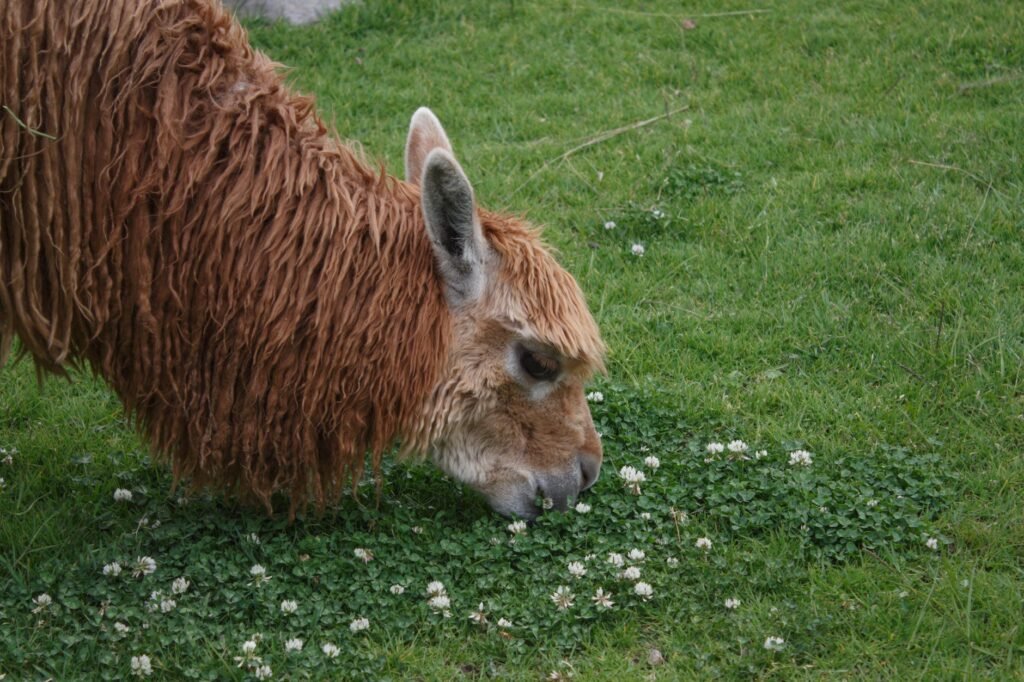Understanding Alpaca Diet: Do They Really Eat Weeds?
Ever wondered what’s on the menu for alpacas? You’re not alone. It’s a common question among potential alpaca owners and animal enthusiasts alike. Alpacas, those adorable, fuzzy creatures native to South America, have a diet that’s more diverse than you might think.
One question that often comes up is, “do alpacas eat weeds?” The short answer: yes, they do. But there’s more to it than that. Just like us, alpacas have dietary preferences and needs that must be met to keep them healthy and happy.
Key Takeaways
- Alpacas do indeed eat weeds, which play a significant role in their diet. Not all weeds are created equal to them and they show a preference based on the ability to detect bitter flavors.
- These animals are selective feeders, carefully picking out and consuming various plants, particularly interested in the crisp leaves or the tender stems of weeds.
- Weeds are nutritionally valuable to alpacas, as they contain essential vitamins and minerals. However, it is absolutely important that they consume variegated food including grasses, woody shrubs, legumes, and hay.
- Alpacas are adept at avoiding toxic plants instinctively which implies their remarkable adaptation, ultimately safeguarding their health and ensuring their survival.
- Alpacas’ diet is a significant factor to their livelihood. A well-rounded diet comprised of diverse plant types can do wonders for their overall health.
- Even though often considered as pests, weeds such as Dandelion, Chickweed, Sunflower, and Clover are surprisingly nutritious to alpacas, containing various vitamins and essential nutrients.
Alpacas: A Diverse Diet
Digging deeper into the menu of alpacas, diversity is key. Yes, they’ll eat weeds, but that’s just the tip of the iceberg lettuce! Once you’ve lived with alpacas, you’ll quickly notice they are not simple grazers.
The Basics
In their Peruvian homelands, these woolly camelids subsist mainly on grasses and woody shrubs. Their digestive systems are specially adapted to breakdown such fibrous plant material. Alpacas’ low protein and high energy diet typically include:
- Grasses: Alfalfa, clover, ryegrass
- Weeds: Dandelions, Plantains, Thistles
But they also eat legumes and hay (in limited amounts).
Branching Out
Alpacas are not limited to Peruvian plants; they are adaptive herbivores with a taste for variety. An alpaca’s dinner plate can range from your average patch of grass to fallen leaves—even fruit on occasion!
However, it’s important to monitor what your alpacas eat. I’ve found that while they might munch on weeds, they’ll typically avoid plants that are toxic to them.
The Sweet Stuff
Let’s get into the dessert course: treats. When you think about it, who doesn’t enjoy a good nibble on something sweet now and then? Alpacas are no strangers to this line of thought. Though natural diet is best, they do enjoy :
- Carrots: They enjoy both the flavor and the crunch.
- Apples: Though they must be small pieces to avoid choking.
- Sugar Cubes: Not a natural part of their diet, but it’s accepted as a treat.
Remember moderation here. Treats should only make up a small percentage of total food intake, in order to keep your alpaca healthy and satisfied. Like people, each alpaca has its own unique tastes and preferences, but bearing in mind these fundamental diet staples, I believe, will guide you well on your alpaca journey.
The Curiosity About Weeds
There’s often a question that floats around: Do alpacas really eat weeds? The answer is a resounding, yes, alpacas do eat weeds. In fact, they’re often beneficial to the farm by helping keep the weed population in check.
Among the things that alpacas munch on, weeds make up a considerable portion. This behavior has deep roots in the alpaca’s natural instinctive feeding habits. For alpacas, weeds aren’t a nuisance; they’re an additional source of nutrients.

One thing you’ll notice about alpacas munching on weeds is their distinct and calculated browsing style. Unlike goats that often strip leaves off branches, alpacas pluck off certain parts of the plant. In this manner, they are selective feeders, favoring particular plants, or even parts of plants over others.
It’s interesting to note that while some animals avoid bitter-tasting plants, alpacas tend to embrace this flavor palate. From thistles to dandelions, there’s a wide range of weeds that alpacas don’t shy away from. However, they’re not indiscriminate eaters that will consume any weed they come across. Alpacas know to avoid toxic plants, a trait that’s a plus for their survival in the wild.
But, it’s not all weeds all the time for these creatures. Alpacas follow a diverse diet and weeds are just one part of it. Alongside weeds, their food intake includes grasses, woody shrubs, and legumes. Furthermore, supplementing their diet with hay is essential, especially during conditions where fresh vegetation is scarce.
Alpacas and weeds indeed share a unique relationship. But there’s more to explore with alpacas’ dietary habits and preferences. Their ability to adapt and vary their food intake extends beyond weeds, painting a vivid picture of alpacas as flexible, versatile feeders.
Do Alpacas Eat Weeds?
Yes, they certainly do. In fact, I’d even go on to state that weeds make up a significant portion of an alpaca’s diet. But they’re not just indiscriminate weed munchers. They’ve got a keen sense of taste and preference when it comes to the variety of weeds they’ll munch on. Not all weeds are created equal in the eyes of alpacas!
Numerous species of weeds including Common Burdock, Dandelion, and Red Clover are particular favorites of the alpacas. They pick out these specific weeds based on their exceptional ability to detect bitter flavors. This peculiar taste preference actually works in complementing their overall feeding behavior. It enables them to adapt to a broad variety of environments and ensures a more balanced diet.
While we’re diving into details, let’s not forget: Alpacas are inherently selective eaters. They nimbly navigate through various plant species and select only the choicest of parts. Be it the crisp, juicy leaves of a weed or the tender stem, nothing goes unnoticed by these discerning grazers.
You might be wondering about the nutritional value here. Well, I’ve got some surprising news! Weeds are more than just filler in an alpaca’s diet, they’re actually nutritionally valuable. Weeds contain significant amount of nutrients such as minerals and vitamins that are essential for the alpacas’ health. Hence, a few weeds in the menu ensure alpacas are properly nourished.
But they aren’t just weed consumers, they’re also sharp detectors of toxic plants. Alpacas know their plants well and instinctively avoid those that could harm them. Not quite the simple grazers we often think them to be, huh?
That being said, their diet is still varied. While weeds do play a notable role, alpacas also have a hearty appetite for grasses, woody shrubs, legumes, and hay. This ability to adapt and vary their food intake makes them such flexible and versatile feeders.
Alpacas’ Dietary Preferences
A closer look at alpacas’ dietary choices reveals an interesting feeding pattern. Alpacas, as selective feeders, have a distinct preference for certain plants and their components. They favor weeds, grasses, woody shrubs, legumes, but also happily munch on hay.

What’s fascinating about these creatures is their sharp instinct when it comes to detecting toxic plants. Despite their varied food intake, they’ve developed a skill to almost unerringly steer clear of harmful vegetation. It’s a remarkable adaptation that safeguards their health and ensures their survival.
On the topic of weeds, on which the main interest of our readers might lie, alpacas are avid consumers. They don’t just consume, they select. A strategic approach is clearly seen in their browsing style. To some extent, it’s been observed that alpacas even embrace bitter-tasting plants as they are aware of the nutritional benefits they bring.
An analysis of their diet shows that weeds, far from a forgotten element, hold substantial nutritional value. They are packed with essential nutrients. To give you an idea, a common weed group that alpacas feed on, Taraxacum officinale or more commonly known as Dandelion, contains key vitamins and minerals beneficial for their health.
Here’s a table to put things into perspective:
| Nutrient | Content In Dandelion |
|---|---|
| Vitamin A | 10161 IU |
| Vitamin C | 35 mg |
| Calcium | 187 mg |
| Iron | 3.1 mg |
These numbers highlight the crucial role weeds play in meeting the nutritional requirements of alpacas, and why they stand as a diet favourite for these intriguing and adaptive feeders. Delving deeper into their dietary habits gives us a clear glimpse into how proficient these creatures are at ensuring their well-being.
Keeping Alpacas Healthy and Happy
In my experience, keeping alpacas both healthy and happy often circles back to their diet. A well-rounded diet, rich in diverse plant types like weeds, grasses, and shrubs, can do wonders for an alpaca’s overall health.
Interestingly, certain weeds offer more than meets the eye. I’ve found dandelions, in particular, to be a powerhouse of nutrition for our furry friends. Apart from its bountiful benefits, it’s hardy and prolific, making it a consistent food source in many regions. But, that doesn’t end the list of surprising weed-benefactors. Chickweed, sunflower and clovers also find their place in the alpaca’s menu offering an array of vitamins and essential nutrients.
Perhaps what’s more fascinating is that alpacas self-regulate their feeding. They know when it’s salad time and when they need a top-up on specific nutrients, instinctively choosing the right plants for their needs.
Here’s a brief rundown of some of the surprising nutritional benefits of those top four weeds for alpacas:
| Weed | Notable Nutrients |
|---|---|
| Dandelion | Calcium, Iron, Vitamins A and C |
| Chickweed | Vitamins C, A, D, B Complex, Iron |
| Sunflower | Vitamin E, Fiber, Zinc |
| Clover | Protein, Phosphorus, Vitamin A |
It may seem odd to some that these ‘pests’ can hold such nutritional strength, but nature knows best. Alpacas will graze, roam, and enjoy their time outdoors in the weed patch, and come out healthier for it!
So, next time you see an alpaca happily munching away on a field strewn with dandelions, know they’re on to something good. Not only are they satisfying their hunger, but they’re also tending to their health needs in the process.
It’s this intelligent, selective feeding that makes alpacas such robust, adaptable creatures. Their diet is, in truth, a testament to their resilience and survival instinct. They’ll optimize their feeding based on what’s available, and yes, that very much includes the underestimated power of weeds.








Our picks
Alpaca & Wool Felted Sole Inserts: Comfy Upgrade?
Best Alpaca Socks for Hiking: Ultimate Comfort and Durability on Trails
Best Alpaca Halter for Comfort and Control